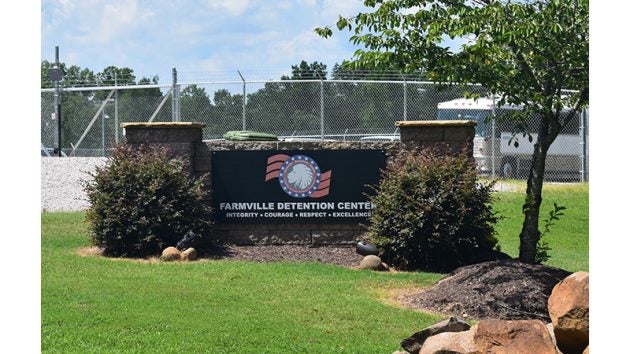No, Farmville didn’t cancel its ICE contract. At least not yet.
Published 5:32 am Tuesday, September 19, 2023

- A look at the outside of the Farmville ICE detention center.
|
Getting your Trinity Audio player ready...
|
FARMVILLE – If the Farmville Town Council terminated its contract with Immigration Centers of America (ICA), what would actually change? That’s what council members want to know before making a decision.
Farmville has what’s known as an intergovernmental service agreement (IGSA) with ICA, the group that operates the U.S. Immigration and Customs Enforcement (ICE) jail facility in town. A council majority wants to end the contract, but would like to know first what impact that would actually have. Would the facility shut down as a result? Or would things simply continue as they are now, but just without the town’s involvement?
“I feel like it would probably be in our best interest to see, if there is no revocation from it, possibly entertaining the idea of withdrawing from this,” council member Thomas Pairet said. “(But first), I would like to know the ramifications to make sure we’re not getting into something we can’t handle.”
The only thing council members know for certain right now is that they would lose some money if they pulled out. Now the real estate tax, personal property tax, business license and water and sewer would still come in, as long as the facility operates. But the town would lose the per diem fee, a yearly payment made as part of the IGSA agreement.
The amount has shifted over the years. In fiscal year 2019, it was $259,016. One year later, that dropped to $210,670. In fiscal year 2021, that dropped to $182,500 and the reduction continued from there. In fiscal year 2022, the town received $167,000 and this past fiscal year, the per diem was $182,500.
Farmville Town Manager Scott Davis told council members during their meeting on Sept. 13 that the town could absorb not getting the per diem.
“We’re growing in other categories business wise,” Davis said. “We have some other interests in the coming future for the town. In a year and one month, we’ve made almost a half a million by investing our money. I don’t know that money is the issue.”
Meanwhile, council members say they’re tired of seeing the town’s name linked to the center when it makes headlines.
About the Farmville Detention Center
And the center keeps doing just that. In 2020, at one point 93% of detainees tested positive for COVID-19. One of those detainees, 72-year-old Canadian national James Thomas Hill, died after catching the virus at the ICE facility. Soon after, it was shut down until July 2022, when a settlement was reached, allowing the facility to reopen with some restrictions. For the next two years, the center can hold no more than 180 people at one time. They can also only accept detainees who are vaccinated, asymptomatic and test negative for COVID-19. Since the facility’s reopened, multiple family members of those detained have spoke up, saying conditions hurt their loved ones’ health.
Gabriella Gonzalez was one of those people. The University of Virginia student migrated to America when she was three years old, with her aunt and older cousin. Undocumented, she qualified for the Deferred Action for Childhood Arrivals (DACA) program, getting temporary protection from deportation. Her cousin Alex was too old to qualify.
When he was arrested in Washington, D.C. for a traffic violation, Alex was taken within 24 hours to the Farmville Detention Center, Gabriella said.
“He got sick frequently because of the unsanitary conditions and lost a lot of weight,” she said.
Two years after being detained, Alex was deported.
Others have claimed the building’s medical practices aren’t what they should be.
“I have been inside the prison on numerous occasions,” Dr. Kate Sugarman said. “I have also reviewed countless medical records of people who have been there. From (those) chart reviews, I know that people in the Farmville (detention center) do not get the medical care they need. They’re denied the proper medicine they need in order to live.”
Those were just two examples of months of comments from people connected to current or former detainees at the facility, each sharing nearly identical stories, with identical requests for the center to be shut down.
A common practice
The headlines didn’t stop there. In August, the Virginia chapter of the American Civil Liberties Union (ACLU) sued the detention center, claiming that people were being held long after they had won their immigration cases. Both German Fuentes and a man identified as “Mr. Gonzalez” were used as examples. Both had won their cases, receiving permission to stay in this country. Despite that, three months after winning, both were still being held at the Farmville facility. ACLU officials claimed that since they started tracking cases in Virginia, 13 of 14 had continued to be detained after winning for more than three months.
Late in August, ICE officials responded to the lawsuit, releasing both men from the Farmville facility, while telling The Herald they couldn’t comment. ICA officials have not responded to requests for comment.
And in each of these cases, because the detention center has Farmville in its name, the town keeps getting linked. The council also has been asked repeatedly by family members of those detained to release their loved ones, when that’s not something they have control over. They’ve also been asked to shut down the facility, but as it’s a private company, again, that’s not something the council can do.
“There is not, to my knowledge, the chance that this body can free anybody,” Farmville Mayor Brian Vincent told the crowd during council’s Wednesday, Sept. 13 meeting. “We don’t have that capacity. That’s a federal issue. And even if we were to decide at some point in the future to separate ourselves from that intergovernmental agreement with ICA and ICE, that does not end immigration detaining. That does not end that ICA facility, that just ends us being a part of it in any shape or form.”
How the ICE process works
Multiple ICE officials made that clear when The Herald reached out over the last week. If the Farmville facility were to shut down, they said, that doesn’t mean everyone inside would be free. They would simply be transferred to another ICE facility. As proof, they provided The Herald with the Detention Facility Termination of Agreement documents. First, the document states any closure would have to be ordered either “by ICE or the agreement holder”, which in this case is the privately owned and operated ICA facility, not the town.
If the facility were to close, then ICE would “notify the DOCC of the number of noncitizens to be relocated so that it can begin coordinating transfers to other facilities.” DOCC in this case stands for Detention Operations Coordination Center.
In that situation, the only way for detainees to be released would be the same as it is now, the document said. Either a legal challenge through the court system or ICE officials could decide to let them go.
“If the facility were to terminate its contract with ICE, ICE could choose to release people currently detained there or transfer them to other facilities,” said ACLU-VA Immigrants’ Rights Attorney Sophia Gregg. “Our hope is that ICE would make individualized custody determinations of those remaining detained to ensure their continued detention is consistent with the administration’s enforcement priorities.”
Why does ICE have a contract with Farmville?
So why does ICE have a contract with Farmville in that case? Nobody at ICE could give The Herald an explanation. In fact, the only one came from the U.S. Government Accountability Office (GAO). It provides auditing and investigative services for Congress. In a January 2021 report, the GAO stated that by contracting through towns as a “middleman”, it helps agencies like ICE bypass some requirements.
“The agency is typically able to enter into IGSAs more quickly than contracts because IGSAs include fewer requirements and less documentation than contracts,” the GAO report said. “For example, unlike contract requirements, according to ICE guidance there is no legal requirement to competitively award an IGSA. Further, when awarding an IGSA, ICE is not required to evaluate the past performance of detention facility operators. Under (contracts), however, ICE requires that prospective contractors submit information on their performance in recent contracts.”
The National Immigrant Justice Center echoed that in a policy brief they shared with The Herald.
“These (IGSAs) usually entail a “pass-through” arrangement, allowing local officials to act as middlemen for ICE and private companies,” the brief said. “With these agreements, ICE contracts with local governments, side-stepping procurement laws that govern contracts with private companies. The counties or municipalities hosting the detention centers then contract directly with the same private companies that operate the facilities, receiving kick-back funds from the private operators. The most recent GAO findings assert that ICE uses IGSAs intentionally to bypass procurement laws and open government requirements.”
Council wants more information
All of that brings us to where we are now. The current IGSA with the town expired on Sept. 15. According to Farmville Town Manager Dr. Scott Davis, officials with the Farmville detention center didn’t send a new version until hours before the council meeting on Sept. 13. That did not win the hearts and minds of council members.
“The timing of this document arriving after we have continuously asked if there was something we had needed to sign and not getting a timely response, I don’t appreciate,” Thomas Pairet said. “I don’t appreciate the ninth hour, dropping the bomb on us. I think it’s very unprofessional.”
By unanimous vote, council members asked Davis to look into the ramifications of not signing the IGSA contract and report back next month. They also asked for patience while this plays out.
“Just give us time to discuss and make our decision,” said Vice Mayor Chuckie Reid. “That’s all we ask.”





